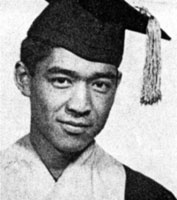

I continued attending classes and working at Douglas Aircraft. All of us helping to build planes in Santa Monica were proud that Douglas's pre-war models were the airplanes that turned back the Japanese at the battles of Coral Sea and Midway. Although not yet of draft age, I began to review my options. The Air Force was always my first choice.
The war brought unity and determination to America but it also brought a nervousness that passed into mass hysteria and paranoia. In early 1942 came the great Japanese air raid on Los Angeles. In the small hours of morning darkness of February 26th we were awakened by sirens and the solid boom! boom! of anti-aircraft guns. We rushed outside to see the sky criss-crossed with searchlights and blazoned with the flash of exploding shells and chains of burning flares floating down from scattered clouds. The airplanes were difficult to see, but "There's one! There's one!" as the clouds briefly parted. The next day we listened avidly to reports on the raid. We learned that over a thousand anti-aircraft rounds had been shot into the night sky. How many Jap Zeroes had been shot down? None! No enemy planes had been within thousands of miles of L.A. Someone fired a gun and every soldier who had something that went BANG joined in the fracas.
And an unhealthy suspicion that we were vulnerable to spies led to an evil act by our Government. American citizens of Japanese descent in the Pacific Coast region were forcibly "relocated". That is, they were herded into concentration camps in the interior states. I felt sorry for college friends who were caught up by this military order. I promised several of my classmates that I would send them their college yearbook as soon as it was published.


Takashi Kudo
General Business
One night my work at the aircraft plant was interrupted by my superior. He handed me a letter and coldly remarked, "This seems to be for you." The letter was from Takashi Kudo, a friend behind barbed wire in a "reception center" in the bitter desert east of the Sierra Nevada. It was addressed to my home. How had it turned up at Douglas Aircraft? And why? The envelope had been ripped open and crudely sealed with staples. Someone was intercepting and reading my mail. Just for helping a friend of Japanese ancestry, self-appointed vigilantes suspected me of disloyalty.
Back to Navigating Through World War II Home Page